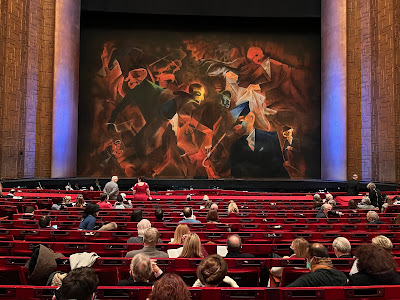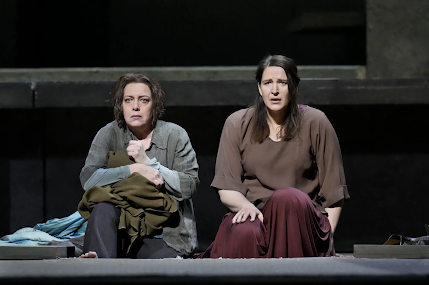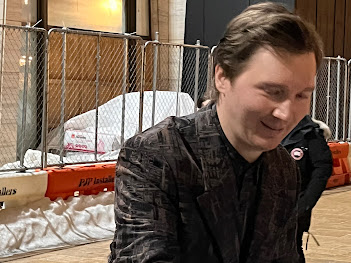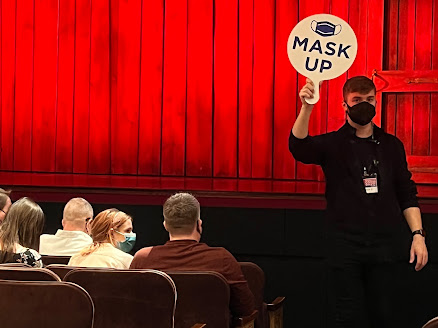The problem with
Bartlett Sher is that he is a gifted theater director, but those same creative gifts don't materialize when he dons his opera hat. Those memorable musical productions at Lincoln Center, both originals and revivals (
The Light in the Piazza,
South Pacific,
The King and I, and
My Fair Lady) have made him a household name for Broadway fans. I wish we could say the same for his operatic output at the
Metropolitan Opera, which at best can be classified as uneven.
Mr. Sher began his association with the MET at the start of Peter Gelb's tenure. His production of The Barber of Seville featured an extension of the stage in front of the orchestra pit -- the infamous passerelle that many critics pointed out was not made for the MET's acoustics. There were also cartloads of pumpkins, and a giant anvil that threatened to fall on the characters Wile E. Coyote style. Perhaps his most successful production at the MET is his staging of The Tales of Hoffman, with its René Magritte bowler hats and homages to different films from Federico Fellini to Ingmar Bergman.
This season Mr. Sher has staged a new production of Rigoletto, Giuseppe Verdi's masterpiece of 1851. As is the current trend in opera staging, God forbid the director set the scene according to the wishes of the original creators. So, instead of traveling to Mantua we get Germany during the period of the Weimar Republic. Now, I have to be careful here criticizing the change of locale. After all, this opera is based on a Victor Hugo play (Le Roi s'Amuse) which takes place in the depraved French court of François I. Verdi's lyricist Francesco Maria Piave thought it best to transfer the scene to Italy. So, the original setting of this work is the depraved court of the Duke of Mantua, a made-up person who was based on Vincenzo Gonzaga, a 1500's royal scoundrel whose family motto, according to the program notes on the playbill, was "Forse che si, forse che no" (Maybe yes, maybe no).

As we come in the auditorium we are faced with a show curtain filled with nightmarish characters right out of the canvases of
Max Beckmann, Otto Dix and George Grosz. But again: why Germany's Weimar Republic? Certainly the unit set built on the MET's turntable (which spins around too much for my taste) by
Michael Yeargan recreate a period of grandiose Fascist architecture that was already entrenched in
Mussolini's Italy years before
Hitler brought Fascism to Germany.
Why not set it in Fascist Italy, then? All the ingredients are there. There's the work of poet Gabriele D'Annunzio, whose writings serve as the precursor of the ideals of Italian Fascism. And of course, there's Pier Paolo Pasolini's film Salò, or the 120 Days of Sodom, a work very much entrenched in the work of D'Annunzio. If you want depravity don't look any further. Salò is the GOAT.
Piotr Beczała has returned to play the Duke, as he did in the last MET production of this work which took place in Las Vegas. He returns with a more mature voice. It is now deeper and his memorable ringing timbre of years past seems to be disappearing. Could it be that he has sung too many performances of Lohengrin at the Bayreuth Festival, a role that many tenors stay away from because it tends to cloud the voice? I would recommend Mr. Beczała to stay away from the swan boat and concentrate more on the Italian and French repertory.
Quinn Kelsey is a huge, bruiser from Honolulu Hawaii with a voice to match. His instrument fills the house, and then some. It is not a particularly beautiful sound, but then again if you are playing a hunchback jester you want a growl in your voice, and Mr. Kelsey can provide that in spades.
For me, if the Sparafucile stinks, then the opera doesn't work. What I mean is that he has to have a strong sustained low F that ends the Act II duet with Rigoletto. Thank goodness the MET has re-hired Italian basso Andrea Mastroni (he made his MET debut in this role in the previous production). Once again he made a vocally chilling assassin, and that outstanding low F is his bread and butter. He has sung this role everywhere from Covent Garden to Madrid.
Unfortunately, I did not get to hear Rosa Feola as Gilda. She could not sing because she had just gotten boosted and was suffering through the effects of the injection. The understudy was announced from the stage. It was a late cancellation for Ms. Feola so there was no paper insert in the programs. So, I have no idea who I heard. She did have a pretty soprano voice, and her "Caro Nome" was greeted with a healthy ovation. MET audiences always treat understudies well, especially if they are able to deliver.
Daniele Rustioni, the new principal guest conductor of the Bavarian State Opera led an enthusiastic reading of the score. Under his direction, the orchestra brought out the transparent and sonorous beauty of Verdi's orchestration which many times is just taken for granted. Particularly fine was the backstage storm chorus, one of the great innovations of this score.
So, there's a new Rigoletto in town. Maybe not the most memorable of productions, but the New York crowd will continue to support this staging as long as the MET management fills it with fine international singers.












